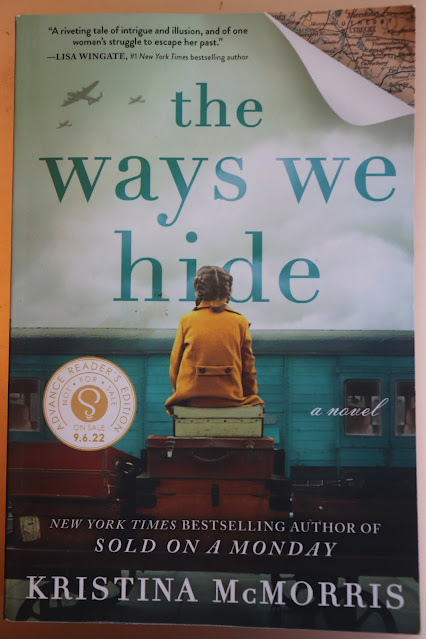There was a new novel, The Ways We Hide, by Kristina McMorris, included in my most recent published list of books read (following my review of The Education of Betsey Stockton) and I want to tell you enough about it to pique your interest in that book, as well. Regular readers of Books in Northport may recall that I was able to reconnect not long ago, through a local friend who has studied close-up sleight-of-hand for years, with someone from my graduate school days who now makes his way in the world as a professional magician. It was in part because of Mark and Larry’s fascination with the world of stage illusions that I was intrigued when an ARC of The Ways We Hide came to me in the mail from Sourcebooks, but I found added appeal in the connection to Copper Country in the Upper Peninsula of Michigan.
A traumatic event in the childhood of the main character, Fenna Vos, has outlines that will be familiar to students of Michigan history. In real life, the Italian Hall Disaster took place in Calumet in 1913, where 73 people, 59 of them children, died in a stairwell trying to escape from a building they thought was on fire. Someone had yelled “Fire!” but there was never any fire; however, the street entrance door at the bottom of the stairs was apparently locked, and children were literally buried alive. For the purposes of her novel’s timeline, McMorris places the event in a fictional town, Eden Springs (also in the U.P.), at a later date, but Fenna’s near-death experience provides clear and obvious motivation to her life-long interest in escapism – not into imaginary worlds (say, through literature) but out of actual physical containers.
The novel’s hair-raising opening scene, however, takes place onstage in 1942 Brooklyn. Young adult Fenna and her partner are performers, and she who appears to the audience as a mere “assistant” is in fact the designer of the containers and escape mechanisms, as well as the instructor of Charles, the apparent Houdini who makes the onstage escapes. What happens in that particular performance unexpectedly takes Fenna far from Brooklyn to behind-the-scenes war work in World War II England with M19. Here again, as was true of the Christmas Eve fire, Fenna’s story involves actual wartime projects little known to the public even today.
I knew about the Italian Hall in Calumet, but not all the other facts-behind-the-fiction in this novel. In fact, as I was reading, I was impressed with how many lifelike events the author created, not realizing how many she had drawn from history. The writing never seems didactic or overloaded with too many dates or details: The story is always front and center.
Fenna has an indissoluble bond with Arie, with whom she survived the Christmas Eve event deadly to so many other children that night. Then there is Charles, her stage partner, who disappears early in the saga but reappears later. Major Hutton, an Englishman who recruits her to work in British intelligence, is based on an actual historical person. Through her experiences with these and other people in her life and unexpected twists and turns along the way – things not always being what they appear -- Fenna gradually grows in self-knowledge and strength.
Who will want to read this book? Those who enjoy history and/or historical fiction and/or love stories and/or intrigue and suspense and/or stage illusions, as well as anyone who simply wants to be pulled into another world and time.
The good news is that The Ways We Hide will be issued in frugal, affordable paperback when released; the “bad” news is that the release date isn’t until September 6. But remember, delayed gratification builds character!
The Ways We Hide
by Kristina McMorris
Sourcebooks, September 2022
Paper, 496pp
$16.99


2 comments:
Sounds intriguing, Pamela. But, as a psychologist, it is the title that drew me in immediately.
There are multiple meanings of hiding in the novel, Karen, psychological as well as literal, which you will appreciate.
Post a Comment